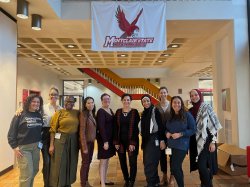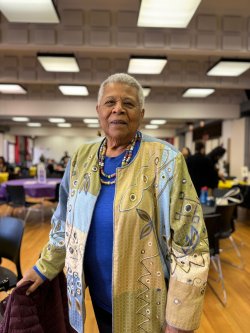Conference Supports Healing and Social Justice Dialogues
University co-sponsored the 18th Annual Liberation-Based Healing Conference, held on campus
Posted in: Education, Humanities and Social Sciences, University

More than 150 community activists, scholars, teachers, social workers, students and staff spent two days on campus for the 18th Annual Liberation-Based Healing Conference, hearing from 35 speakers, artists and performers who provided space for dialogue and healing.
“The dialogues, which were critical and robust, were not politicized,” says Associate Teaching and Learning Professor Mayida Zaal. “Rather, they focused on recognizing one another’s humanity. Students shared that it was impactful to attend such an event on our campus given that it provided an authentic intellectual space that pushed their thinking.”
Zaal, an activist scholar committed to issues of social justice and equity, co-hosted the November 3-4 conference at Montclair along with Rhea Almeida, the conference’s founder and the director of Institute for Family Services in Somerset, New Jersey, and Deja Amos, operations manager at Tri-County Care Management Organization, which supports the needs of youths who are experiencing behavioral, emotional, social, developmental and mental health challenges.

Among the 35 speakers and panelists was Minnijean Brown-Trickey, one of the so-called “Little Rock 9” – nine African American students who collectively resisted opposition to desegregate Little Rock Central High School in 1957, with protection from federal troops. Since then, Brown-Trickey has been an advocate with a lifelong commitment to peacemaking, environmental issues, developing youth leadership, diversity education, cross-cultural communication, and gender and social justice advocacy.
In feedback after the conference, one student wrote “I was honored to be in the presence of Ms. MinnieJean Brown-Trickey. Her testimony was powerful and her vulnerability to share her recognition that she experienced sorrow underneath the anger was profound.”
The Montclair centers, offices and departments co-sponsoring the event were the Office of the Provost, Department of Teaching and Learning, Center of Pedagogy, Montclair Network for Educational Renewal, College of Humanities and Social Sciences, Department of Religion and Department of Social Work and Child Advocacy.
The two days of dialogue, reflections, panels, performances and presentations included such topics as “Reparative Voices for the Injuries of Enslavement and Genocide: Unveiling Hidden Narratives of Black Belonging, Community in Appalachia and the Holocaust,” “Dance as Expression of Liberation for Deaf Individuals,” “Redefining Organizations as Spaces for Racial and Gender Equity,” and “Immigrant Justice.”
There were several performances featured throughout the conference including: Vanguard Theater Company, whose mission is to challenge social and cultural narratives through professional theater; the Meta Theater Company, which seeks to abolish oppression through live interactive performance; the Redhawk Native American Arts Council, educating the general public about Indigenous American heritage through song, dance and theater; the Congolese dance company Mfouambila Kongo Dance Company, which promotes Central African culture through dialogue, theater and history; and international African American deaf choreographer, dancer, instructor and advocate Antoine Hunter.
“Every presenter showed that they cared about us as an audience,” one student wrote in the conference feedback. Another called it a “transformative experience.”
